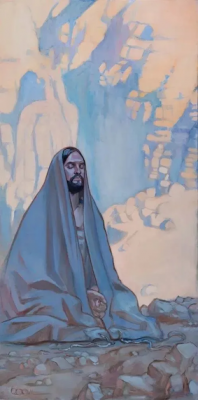Gospel in Art: Why do your disciples not fast?

Fasting in the Wilderness, 2012 © Rose Datoc Dall Artist
Source: Christian Art
Gospel of 15 January 2024
Mark 2:18-22
One day when John's disciples and the Pharisees were fasting, some people came to Jesus and said to him, 'Why is it that John's disciples and the disciples of the Pharisees fast, but your disciples do not?' Jesus replied, 'Surely the bridegroom's attendants would never think of fasting while the bridegroom is still with them? As long as they have the bridegroom with them, they could not think of fasting. But the time will come for the bridegroom to be taken away from them, and then, on that day, they will fast. No one sews a piece of unshrunken cloth on an old cloak; if he does, the patch pulls away from it, the new from the old, and the tear gets worse. And nobody puts new wine into old wineskins; if he does, the wine will burst the skins, and the wine is lost and the skins too. No! New wine, fresh skins!'
Reflection on the painting
From the questions people were asking in today's reading, we can see how they misunderstood what fasting is. They considered fasting to be an end in itself. But fasting is a means, not an end.
As with any other practices in our faith, we should see fasting as a means to bring us closer to Christ. Jesus is telling us today that fasting is good, but ultimately getting to know Jesus is the main point of all such things. He reminds us that every practice within our faith should be there to enable and help us to know, trust and love Christ even more.
Our painting by Filipino-American Artist Rose Datoc Dall depicts Jesus fasting in the wilderness. He is seen cloaked with a Hebrew prayer shawl, a tallit. Tallit literally means a 'little tent' or closet in which one can close oneself off from the world in order to pray and spend time with God. Some small snakes are crawling around Jesus. Evil looms. Jesus knew that fasting was not enough, and should only be done when it is at service of a higher purpose: bringing us closer to God and to him.
Our Gospel reading also reveals how people saw a difference between the ministry of John the Baptist and the ministry of Jesus. Whereas John and his disciples were recognised as people who fasted a lot, Jesus and his disciples were not known for fasting. As Jews, they also would have fasted though. Prayer, fasting and almsgiving were three of the central Jewish practices that Jesus and his disciples valued and lived by. Yet, the gospels suggest that a close friendship and relationship with Jesus was more important to him than fasting.
LINKS
Gospel in Art: https://christian.art/
Today's Reflection: https://christian.art/daily-gospel-reading/mark-2-18-22-2024/


















